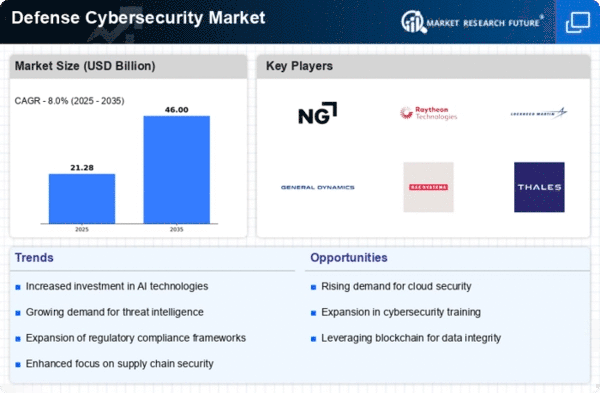Top Industry Leaders in the Defense Cybersecurity Market

Strategies Adopted:
Key players in the defense cybersecurity market adopt multifaceted strategies to address evolving threats. Northrop Grumman focuses on developing advanced threat detection and response capabilities, leveraging artificial intelligence (AI) and machine learning. Lockheed Martin emphasizes a holistic approach, integrating cybersecurity measures into the design and development of defense systems. Raytheon Technologies invests in innovative solutions, such as quantum-resistant cryptography, to stay ahead of emerging cyber threats. BAE Systems prioritizes collaboration, working closely with government agencies and industry partners to enhance the overall cybersecurity posture of defense systems.
Competitive Landscape of Defense Cybersecurity Market:
- Northrop Grumman Corporation
- Raytheon Technologies Corporation
- Thales S.A.
- The Boeing Company
- IBM Corporation
- Cisco Systems Inc.
- among others
Factors for Market Share Analysis:
The landscape of the defense cybersecurity market is influenced by several factors, including the ability to provide robust protection against cyber threats, compliance with stringent military standards, and the integration of cutting-edge technologies. Market share is also contingent on the capacity to offer end-to-end cybersecurity solutions, including threat intelligence, secure communications, and incident response. Continuous innovation, adherence to regulatory requirements, and the ability to adapt to dynamic cyber threats are critical factors for analyzing and maintaining market share in this highly sensitive and rapidly evolving sector.
New and Emerging Companies:
The defense cybersecurity market has witnessed the emergence of innovative companies specializing in niche areas of cybersecurity. Darktrace, a UK-based firm, has gained prominence for its use of AI in cybersecurity, providing autonomous threat detection and response. CrowdStrike, an American company, is recognized for its cloud-native endpoint protection solutions. These emerging players bring agility and advanced technologies to the defense cybersecurity landscape, addressing specific challenges in the realm of military cyber defense.
Industry News:
Recent developments in the defense cybersecurity sector highlight the increasing sophistication of cyber threats and the corresponding efforts to strengthen cyber defenses. The rise of nation-state cyber attacks has prompted defense cybersecurity companies to enhance their capabilities, leading to the development of more resilient and adaptive cybersecurity solutions. Collaborations between government agencies and cybersecurity firms to share threat intelligence and improve incident response capabilities have been a prevalent theme in recent industry news. Additionally, advancements in quantum-resistant encryption, zero-trust architectures, and secure cloud solutions are shaping the future of defense cybersecurity.
Current Company Investment Trends:
Investments in defense cybersecurity are driven by the need to stay ahead of rapidly evolving cyber threats. Key players are investing heavily in research and development to create next-generation cybersecurity technologies. There is a notable trend towards the integration of AI and machine learning in cybersecurity solutions, enabling proactive threat detection and response. Investments are also directed towards strengthening partnerships with government entities and fostering collaboration within the industry. The development of secure communication solutions and the exploration of quantum-safe encryption technologies are areas witnessing significant investment to ensure the resilience of defense cyber infrastructure.
Overall Competitive Scenario:
The overall competitive scenario in the defense cybersecurity market is characterized by a combination of established defense contractors and agile, specialized cybersecurity firms. Traditional industry leaders leverage their extensive experience and resources to provide comprehensive cybersecurity solutions tailored for military applications. Concurrently, new entrants and emerging companies introduce innovative approaches, often focused on niche areas of cybersecurity. Collaboration between government agencies, defense contractors, and cybersecurity firms is crucial in addressing the complex and evolving nature of cyber threats faced by defense systems. The competitive landscape is shaped by continuous advancements in technologies like AI, machine learning, and quantum-resistant cryptography. As the defense cybersecurity market evolves, the synergy between established players and emerging technologies is poised to define the sector's future, ensuring the resilience and security of critical military systems and infrastructure.
Recent Development:
Lockheed Martin: On January 25, 2024, Lockheed Martin partnered with Claroty to improve cybersecurity for industrial control systems used in defense applications. This collaboration aims to address growing threats targeting critical infrastructure.
Raytheon Technologies: On January 19, 2024, Raytheon Intelligence & Space (RIS) secured a $33.6 million contract from NATO to provide cyber defense capabilities and configuration services. This project signifies NATO's commitment to strengthening its cyber resilience.











